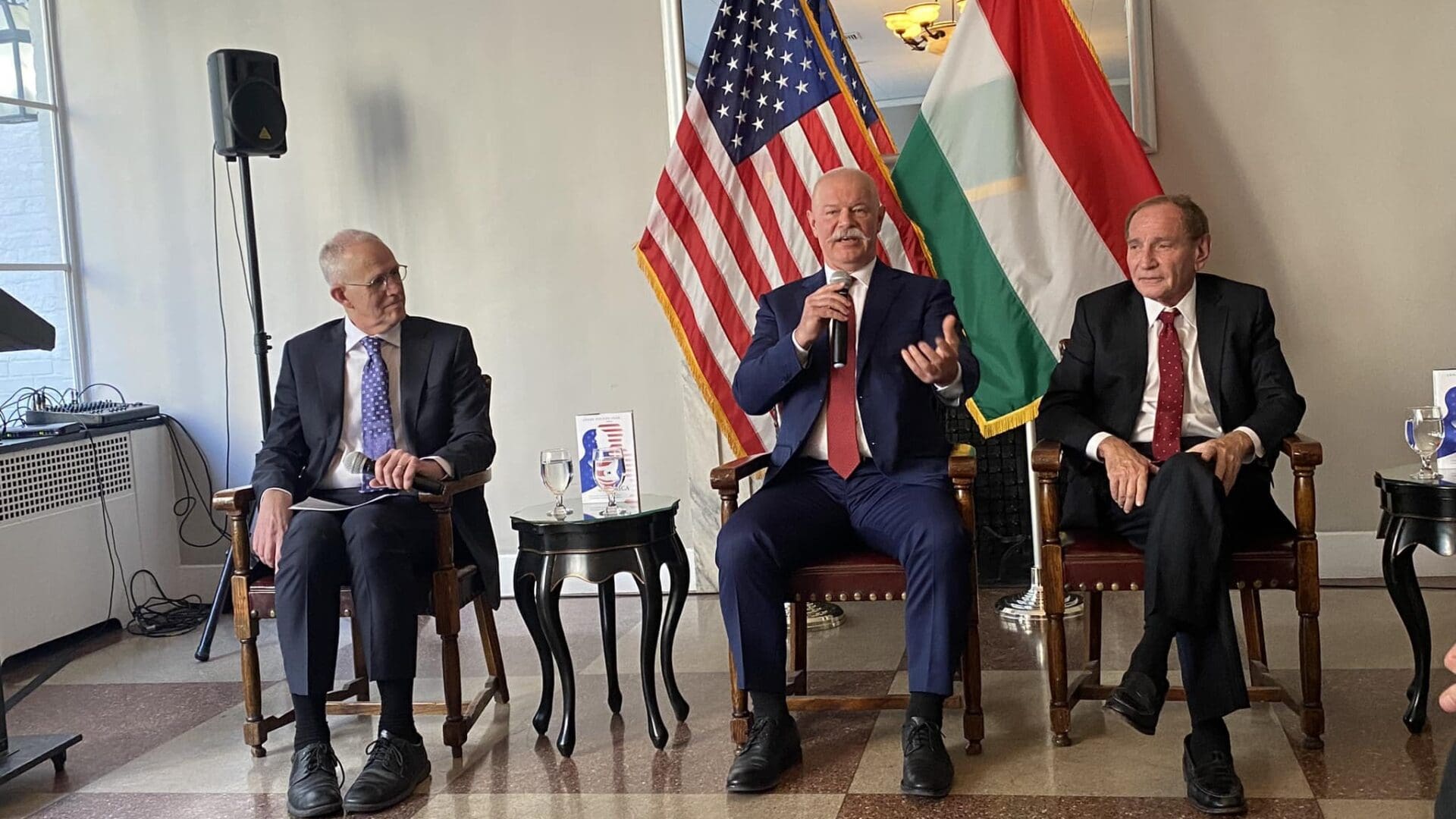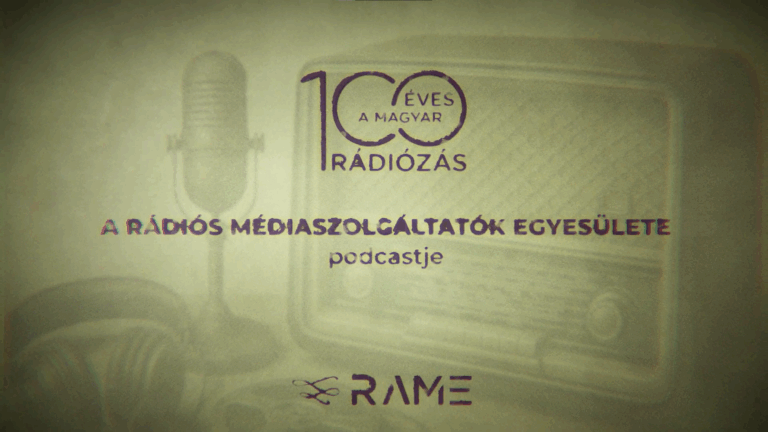Hungarian Minister of Culture and Innovation János Csák was welcomed in New York for the recent American launch of his book The Genius of America published by Angelico Press. The panel discussion of the event was organized by the New York Liszt Institute and was hosted by the publisher’s director John Riess. Panelists included the author himself, leading U.S. geopolitical analyst George Friedman and economic strategist and deputy editor of Asia Times David P. Goldman.
The director of Angelico Press opened the event by confessing that when he had started Angelico Press twelve years ago, he hadn’t anticipated the myriad directions their publishing activities would take. For example, he had never imagined that they’d publish a worldwide bestseller In Sinu Jesu translated into a dozen languages or works by distinguished theologians as David Bentley Hart and John Milbank; works of short stories, science and religion, Russian philosophy, law and jurisprudence, even new collections of poetry. Thus, he quickly learned ‘to expect the unexpected’ in terms of submissions, which was also the case when he received an email from Gladden Pappin about a book by current Hungarian Minister of Culture and Innovation János Csák. ‘I read through the book and was immediately struck by the fresh articulation of some of the ideas and ideals that comprise our grand experiment in the order of liberty, as Richard John Neuhaus used to like to call it. And I quickly said yes to publication’, he explained.
Mr. Riess continued with praising the author: ‘Working with many, many authors over the past 25 years, I have learned that one can never quite anticipate how things might go in meeting an author, sometimes a strange and unusual breed.
Meeting János, however, felt like meeting an old friend.
What immediately came across to me was an old-world intelligence and integrity, but also, a directness of familiarity and ease, a lack of pretense that seemed to be very American.’ He also illustrated his point by quoting from John Lukács, who emigrated to the U.S. from Hungary at the end of World War II, and who was fond of saying: ‘Hungary is my mother, but America is my wife’. Mr. Riess believes that Mr. Csák ‘also relates a bit to that sentiment as he has deep roots in his own country, but has also a genuine love and admiration for this country as well. And that love and admiration comes across biblically in his book.’
What the publisher seemed to appreciate the most is the author’s complex viewpoint when analyzing America. ‘One of the painful effects of the compartmentalization of our multitude of disciplinary domains is the articulation of single causes to explain events. Scientists too frequently get very partial and narrow monocausal explanations. Similarly, they too often attempt to reduce a country’s history to a single strand drawn from either its successes or its failures, its strengths or its weaknesses. Many times, it takes someone from outside the country to paint a more holistic picture’, he concluded; adding that The Genius of America is now part of that great tradition of the outside observers as diverse as Tocqueville, Frances Trollope, Charles Dickens, G.K. Chesterton, and many others. He stated that the book is much more than an extended political essay; it’s about certain ideas and ideals that found a unique political expression in America, and above all, it’s a reminder that Americans have had and still have their ‘flaws and weaknesses, but unlike what many students have been taught in recent years, the warped and simplistic view of America needs to really be expunged from our thinking once and for all’, since every nation’s history is tightly wound by ‘strands of good and evil’, especially in the ‘dynamo that is America’.
Finally, Mr. Riess expressed his hope that many American readers would find in this book a fresh take on their country. ‘We’re always being exhorted to have an honest conversation about the issues of race or gender or privilege. So, let’s also have one about the country itself, what it meant to our ancestors and what it might still mean to us. Read The Genius of America, comment, argue, discuss, contend, debate. That is, at least I hope, still the American way.’ On behalf of the publishing company, he thanked Mr. Csák and all his colleagues for ‘continuing a lovely relationship between Hungary and America; one that I truly hope will deepen in the years ahead’.
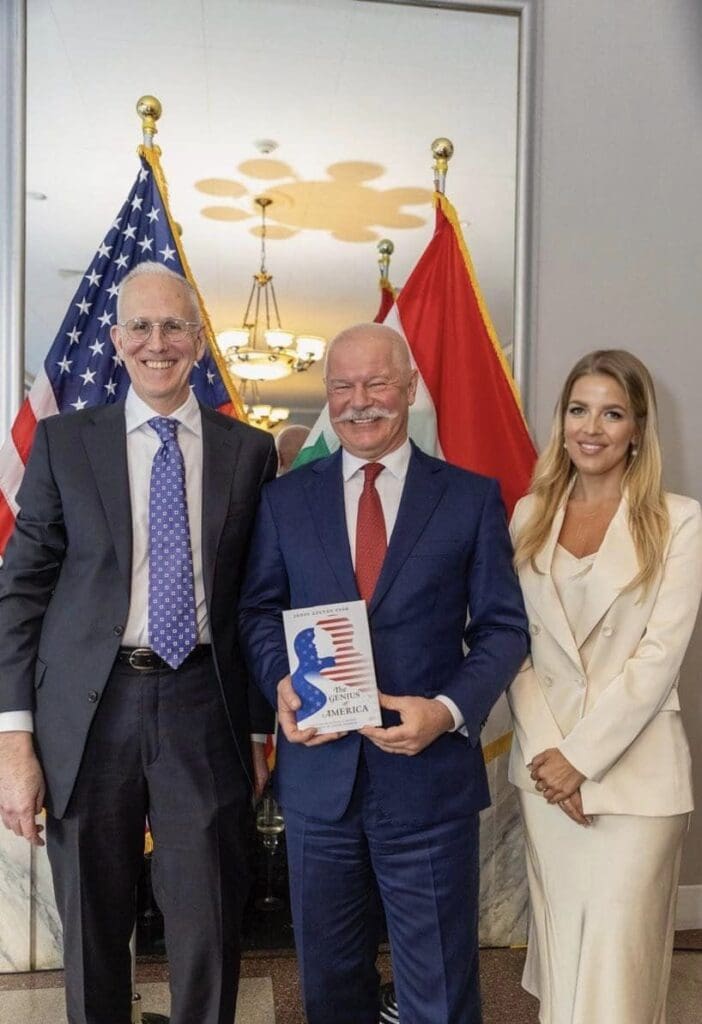
Mr. Csák recalled being a young boy dreaming about America, which, during the communist regime, seemed impossible to visit, especially since some of his relatives fled Hungary in 1956, after the revolution and freedom fight was suppressed by the occupying Soviet forces. When he could finally visit the U.S. for the first time, everything he had read about America seemed to be true, and he fell in love with the country. He revealed that the origin of his book dates to 2020, when his friend George Friedman published The Storm Before the Calm. When he read that book, he started to write a foreword to it, continuing in writing his previous verbal discussions with Mr. Friedman, which then grew to become an essay and later a whole book. He explained that when he had started writing, he had gone back to the original ancient questions by Plato: What is a good life? How should we live? He realized that the founding fathers of the U.S. tried to answer that question with ‘independence, life, liberty and pursuit of happiness’, and that ‘they were brave and smart enough to convince the contemporaries that it makes sense to offer a new solution, a new organizational structure, the American experiment of ordered liberty’. He then started digging for the roots of those ideas (stemming from antiquity—Jerusalem, Athens, Rome—and the Enlightenment of the 18th century) and how they could translate into a sustainable organization of a huge country.
While he was told that he should have gone deeper into contemporary issues, he only did that to a certain extent in the epilogue. ‘It’s not a prediction, it’s not strategizing, it’s just thinking about what could happen’, he explained, adding that he is very happy that it was published in English half a year before the upcoming U.S. elections, so people could read it ‘with a peaceful mind before everything gets crazy, controversial, and really aggressive’. He also claimed that what made the Western world successful is the possibility of arguing and accepting disagreement. ‘I would be the happiest if this book would be indeed discussed, debated, argued because no one can claim that he or she knows America. America is an ever-changing entity.’
Leading U.S. geopolitical analyst George Friedman first shared with the audience that his father was a Hungarian fighting in the Hungarian army and from the refugee camp he wanted to go nowhere else but to America, to a country which could not be invaded and could not invade other people. ‘After the war it was a simple dream to go to a place which is safe. Not just, not moral, but safe. And to understand why this is America, we have to understand that it is an invented country, invented literally by men creating a constitution, a political order, a republic out of nothing’, stated Mr. Friedman. He repeatedly pointed out that
the U.S. is an inventive country and Americans are constantly reinventing themselves and their ways.
‘The rest of the world constantly thinks that America will collapse, because we say unsayable things to each other, we distrust each other profoundly and we engage in criminal actions so we clearly are going to collapse, but in each circle, we reinvent ourselves’, he said.
Mr. Friedman believes that the genius of America is reinvention as a norm, and it was built in the Constitution which itself was not intended to be permanent, since there are rules about how to change it. ‘When you consider that the U.S. is mobile, changeable, transformable, you understand why it survives things other countries can’t. We can survive the most delicate racial issues and the most brutal political issues. If you leave and come back after ten years, you do not recognize the U.S.: all arguments are different. Heated in the same way, but never the same. This is the country which doesn’t do the changes peacefully, gently. I do not know of any other nation that has the ability to transform itself. This nation survived the Civil War and became the largest producer of goods.’ He considers that one of the great features of America is to always feel that everything is lost, the world is horrible, the President will destroy the nation next week; but this is not reality; reality is that every time Americans invent something, they invent a solution to something. That’s the American process that most other countries don’t have, he concluded.
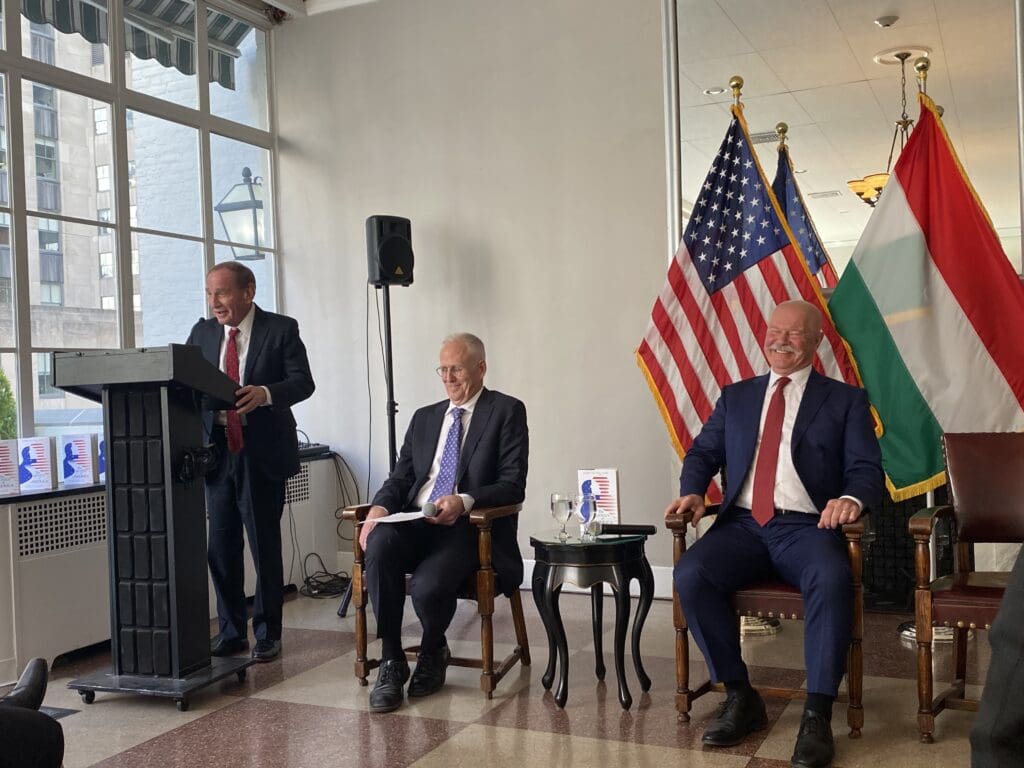
American economic strategist David P. Goldman stated that he had the fortune to review a dozen or so books a year and virtually everything that came into his hands could be summarized on a dozen index cards. He found János Csák’s book exactly the opposite: a short one which takes longer to read than many voluminous books because every sentence must be read carefully and the chain of reasoning must be followed. He believes America is a massive contradiction, and to begin to understand it, one must work through these contradictions. ‘You can’t simply say America’s this, America’s that. We don’t make sense even to ourselves.
To have a distinguished thinker like János Csák explaining this to us is enormously valuable.’
He confessed that he was one of the original signers of the call for the National Conservative movement, which hosted the Hungarian Prime Minister at its most recent conference in Brussels, Belgium. A close friend of his, the editor of the Claremont Review of Books (a publication of the Claremont Institute, of which Mr. Goldman is a fellow), recently attacked him claiming: ‘We are logically inconsistent. We are different from other countries. We have a founding, we have a constitution, we have a philosophy behind it. Why do you have to mix in European nationalism and these other strange phenomena?’ Mr. Goldman felt a bit embarrassed because his friend was completely right in what he said. ‘If János’s book had been out, I would have said: just read this book and it’ll explain it to you.’ But instead, he answered: ‘We have two foundings. We have the religious, spiritual founding vision of the city on the hill and we’ve got the city on the Earth. And these two will never meet. The heavenly city is a point of perspective at the horizon which we look towards, but without its vision—which we can’t realize in our ordinary practice in the marketplace in the cut and thrust of politics—, the invisible hand grows palsied and loses its strength.’
He considers that the brilliance of János Csák’s book is to lay out these contradictions and confront the Americans with them and make clear that although they are ‘unusual, self-invented people, we have an inherent propensity towards not just complacency, but to confuse our interests with the right, the moral, and the good, which are not quite the same’, since there are a lot of things that governments and states have to do which are difficult and not ideal or good. He explained that Mr. Csák compasses this in his discussion of manifest destiny—which is the core of the book—, and contrast that with Abraham Lincoln, who himself is ‘our great contradiction, because nothing in America prior to Lincoln’s presidency would predict that we would have a politician of a character of Lincoln to hold us up to a mirror and demand that we submit ourselves to define judgment and not just the judgment of our own self-interest.’
Mr. Goldman reminded us that the Americans in their own political discourse have an unfortunate tendency to either praise or damn themselves. ‘We have the woke, Hegelian, Neo-Marxist, Frankfurt School left that says everything that came before you was misogynist, homophobic, racist and all other bad things, so we’re now going to create the first perfect clean society stripped of all these terrible things. And there are the defenders of America who never want to apologize for every dumb thing Americans have ever done, including the extermination of (native) Americans—which is a theme of great importance in this book—, and of course, slavery.’
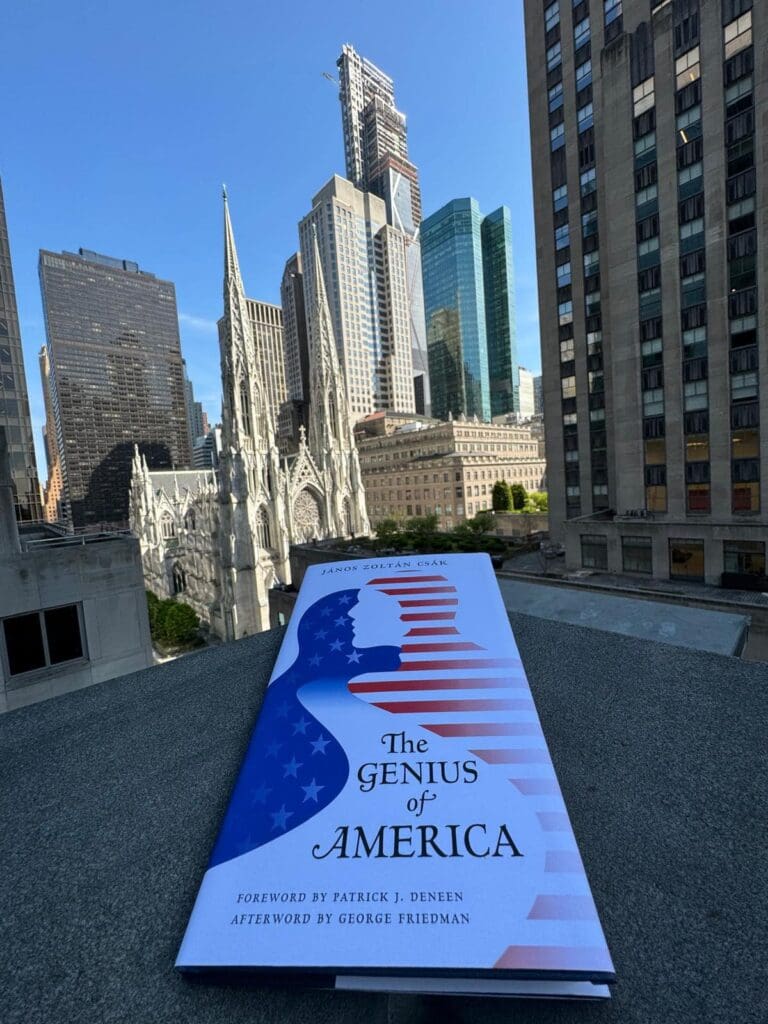
Finally, he called our attention to George Friedman’s epilogue to the book and his citation of the American national anthem. He reminded us that it very unusually ends with a special kind of question which could also be interpreted as: Are we still fit to be Americans? Are we still brave? Are we still free? Mr. Goldman said that János Csák’s work holds us up to the same question that the anthem does, by putting these contradictions ‘in such clear language and so expressively’ and expressed his hope that ‘it will be a great use to us in stepping outside of the way we usually look at ourselves and understand ourselves better and around the world help the world understand us.’
Related articles:

